Health and Social Care Task 3: Medication Policy Review Report
VerifiedAdded on 2023/06/11
|9
|2333
|238
Report
AI Summary
This report provides a comprehensive review of medication policies within a residential home setting, emphasizing the importance of monitoring these policies and practices to ensure patient safety and well-being. It highlights the necessity of effective medication support, including proper administration, timely reminders, and safe storage, while also stressing the significance of collaboration with pharmacists and other healthcare professionals. The report further discusses the impact of policy review on health and safety, noting how it helps identify potential hazards and adverse effects, promotes a positive health and safety culture, and ensures compliance with government regulations. Furthermore, the reflection on personal contribution emphasizes the role of a nurse in providing effective care, maintaining hygiene standards, and fostering open communication with patients to build trust and address their needs effectively. The report concludes by advocating for continuous learning and adaptation of new technologies to enhance the quality of healthcare services provided.
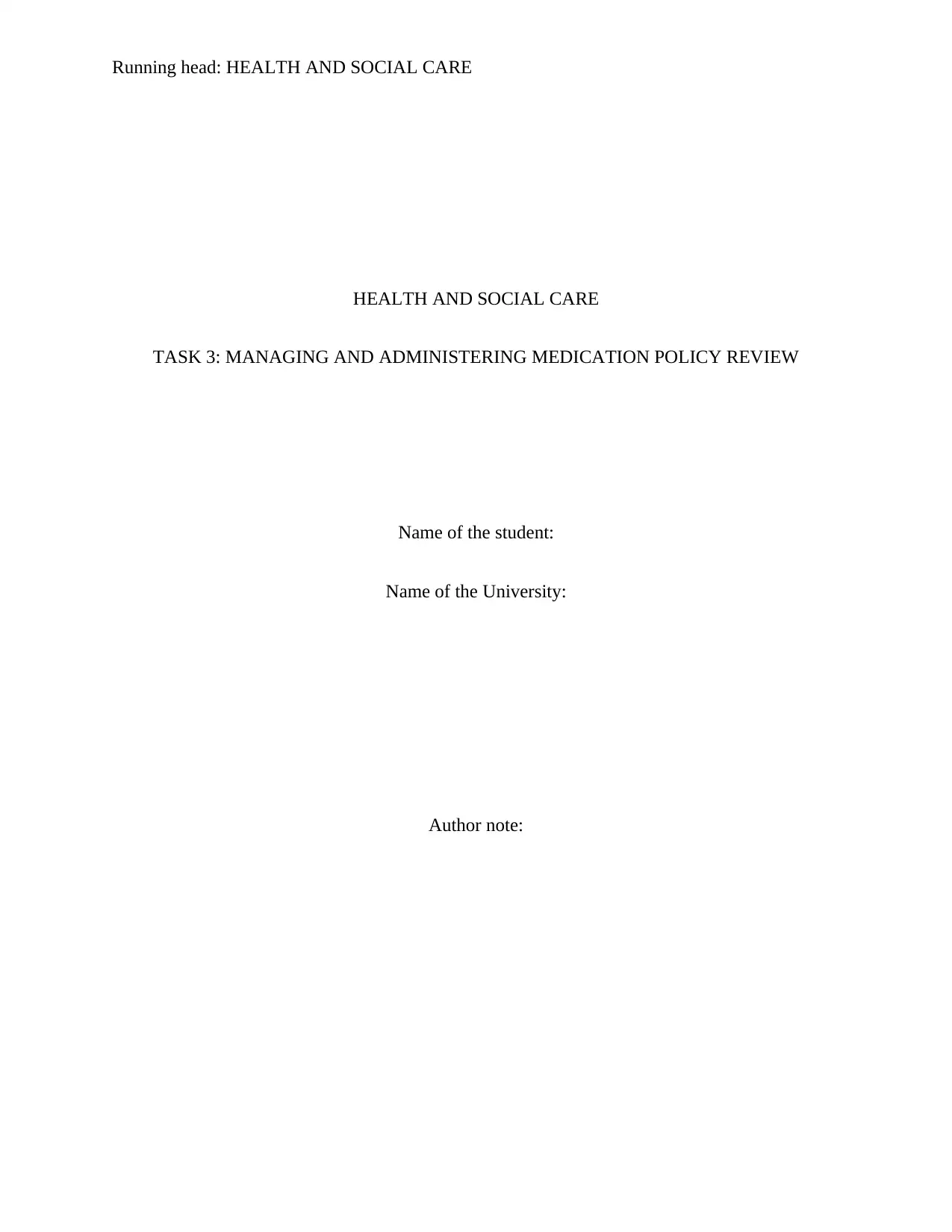
Running head: HEALTH AND SOCIAL CARE
HEALTH AND SOCIAL CARE
TASK 3: MANAGING AND ADMINISTERING MEDICATION POLICY REVIEW
Name of the student:
Name of the University:
Author note:
HEALTH AND SOCIAL CARE
TASK 3: MANAGING AND ADMINISTERING MEDICATION POLICY REVIEW
Name of the student:
Name of the University:
Author note:
Paraphrase This Document
Need a fresh take? Get an instant paraphrase of this document with our AI Paraphraser
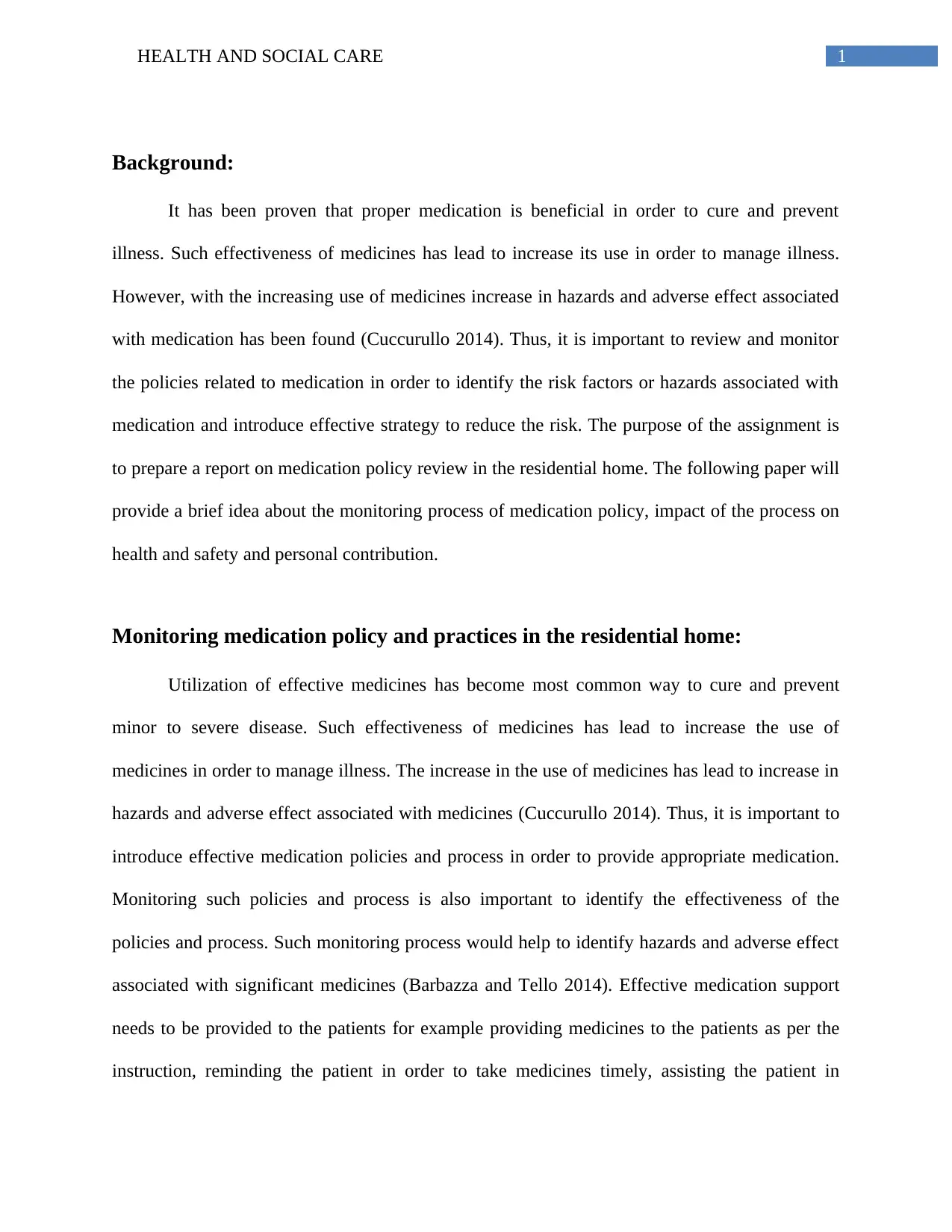
1HEALTH AND SOCIAL CARE
Background:
It has been proven that proper medication is beneficial in order to cure and prevent
illness. Such effectiveness of medicines has lead to increase its use in order to manage illness.
However, with the increasing use of medicines increase in hazards and adverse effect associated
with medication has been found (Cuccurullo 2014). Thus, it is important to review and monitor
the policies related to medication in order to identify the risk factors or hazards associated with
medication and introduce effective strategy to reduce the risk. The purpose of the assignment is
to prepare a report on medication policy review in the residential home. The following paper will
provide a brief idea about the monitoring process of medication policy, impact of the process on
health and safety and personal contribution.
Monitoring medication policy and practices in the residential home:
Utilization of effective medicines has become most common way to cure and prevent
minor to severe disease. Such effectiveness of medicines has lead to increase the use of
medicines in order to manage illness. The increase in the use of medicines has lead to increase in
hazards and adverse effect associated with medicines (Cuccurullo 2014). Thus, it is important to
introduce effective medication policies and process in order to provide appropriate medication.
Monitoring such policies and process is also important to identify the effectiveness of the
policies and process. Such monitoring process would help to identify hazards and adverse effect
associated with significant medicines (Barbazza and Tello 2014). Effective medication support
needs to be provided to the patients for example providing medicines to the patients as per the
instruction, reminding the patient in order to take medicines timely, assisting the patient in
Background:
It has been proven that proper medication is beneficial in order to cure and prevent
illness. Such effectiveness of medicines has lead to increase its use in order to manage illness.
However, with the increasing use of medicines increase in hazards and adverse effect associated
with medication has been found (Cuccurullo 2014). Thus, it is important to review and monitor
the policies related to medication in order to identify the risk factors or hazards associated with
medication and introduce effective strategy to reduce the risk. The purpose of the assignment is
to prepare a report on medication policy review in the residential home. The following paper will
provide a brief idea about the monitoring process of medication policy, impact of the process on
health and safety and personal contribution.
Monitoring medication policy and practices in the residential home:
Utilization of effective medicines has become most common way to cure and prevent
minor to severe disease. Such effectiveness of medicines has lead to increase the use of
medicines in order to manage illness. The increase in the use of medicines has lead to increase in
hazards and adverse effect associated with medicines (Cuccurullo 2014). Thus, it is important to
introduce effective medication policies and process in order to provide appropriate medication.
Monitoring such policies and process is also important to identify the effectiveness of the
policies and process. Such monitoring process would help to identify hazards and adverse effect
associated with significant medicines (Barbazza and Tello 2014). Effective medication support
needs to be provided to the patients for example providing medicines to the patients as per the
instruction, reminding the patient in order to take medicines timely, assisting the patient in
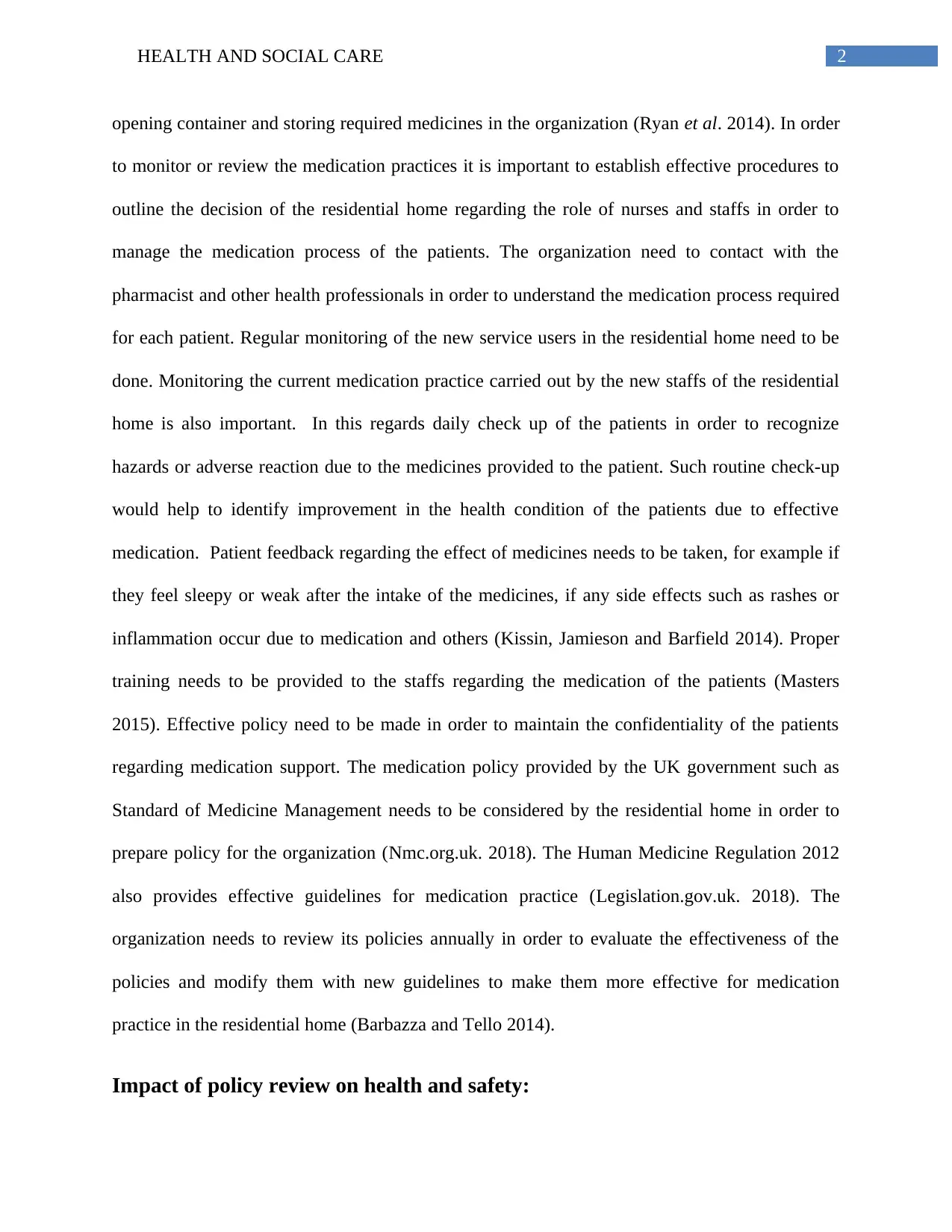
2HEALTH AND SOCIAL CARE
opening container and storing required medicines in the organization (Ryan et al. 2014). In order
to monitor or review the medication practices it is important to establish effective procedures to
outline the decision of the residential home regarding the role of nurses and staffs in order to
manage the medication process of the patients. The organization need to contact with the
pharmacist and other health professionals in order to understand the medication process required
for each patient. Regular monitoring of the new service users in the residential home need to be
done. Monitoring the current medication practice carried out by the new staffs of the residential
home is also important. In this regards daily check up of the patients in order to recognize
hazards or adverse reaction due to the medicines provided to the patient. Such routine check-up
would help to identify improvement in the health condition of the patients due to effective
medication. Patient feedback regarding the effect of medicines needs to be taken, for example if
they feel sleepy or weak after the intake of the medicines, if any side effects such as rashes or
inflammation occur due to medication and others (Kissin, Jamieson and Barfield 2014). Proper
training needs to be provided to the staffs regarding the medication of the patients (Masters
2015). Effective policy need to be made in order to maintain the confidentiality of the patients
regarding medication support. The medication policy provided by the UK government such as
Standard of Medicine Management needs to be considered by the residential home in order to
prepare policy for the organization (Nmc.org.uk. 2018). The Human Medicine Regulation 2012
also provides effective guidelines for medication practice (Legislation.gov.uk. 2018). The
organization needs to review its policies annually in order to evaluate the effectiveness of the
policies and modify them with new guidelines to make them more effective for medication
practice in the residential home (Barbazza and Tello 2014).
Impact of policy review on health and safety:
opening container and storing required medicines in the organization (Ryan et al. 2014). In order
to monitor or review the medication practices it is important to establish effective procedures to
outline the decision of the residential home regarding the role of nurses and staffs in order to
manage the medication process of the patients. The organization need to contact with the
pharmacist and other health professionals in order to understand the medication process required
for each patient. Regular monitoring of the new service users in the residential home need to be
done. Monitoring the current medication practice carried out by the new staffs of the residential
home is also important. In this regards daily check up of the patients in order to recognize
hazards or adverse reaction due to the medicines provided to the patient. Such routine check-up
would help to identify improvement in the health condition of the patients due to effective
medication. Patient feedback regarding the effect of medicines needs to be taken, for example if
they feel sleepy or weak after the intake of the medicines, if any side effects such as rashes or
inflammation occur due to medication and others (Kissin, Jamieson and Barfield 2014). Proper
training needs to be provided to the staffs regarding the medication of the patients (Masters
2015). Effective policy need to be made in order to maintain the confidentiality of the patients
regarding medication support. The medication policy provided by the UK government such as
Standard of Medicine Management needs to be considered by the residential home in order to
prepare policy for the organization (Nmc.org.uk. 2018). The Human Medicine Regulation 2012
also provides effective guidelines for medication practice (Legislation.gov.uk. 2018). The
organization needs to review its policies annually in order to evaluate the effectiveness of the
policies and modify them with new guidelines to make them more effective for medication
practice in the residential home (Barbazza and Tello 2014).
Impact of policy review on health and safety:
⊘ This is a preview!⊘
Do you want full access?
Subscribe today to unlock all pages.

Trusted by 1+ million students worldwide
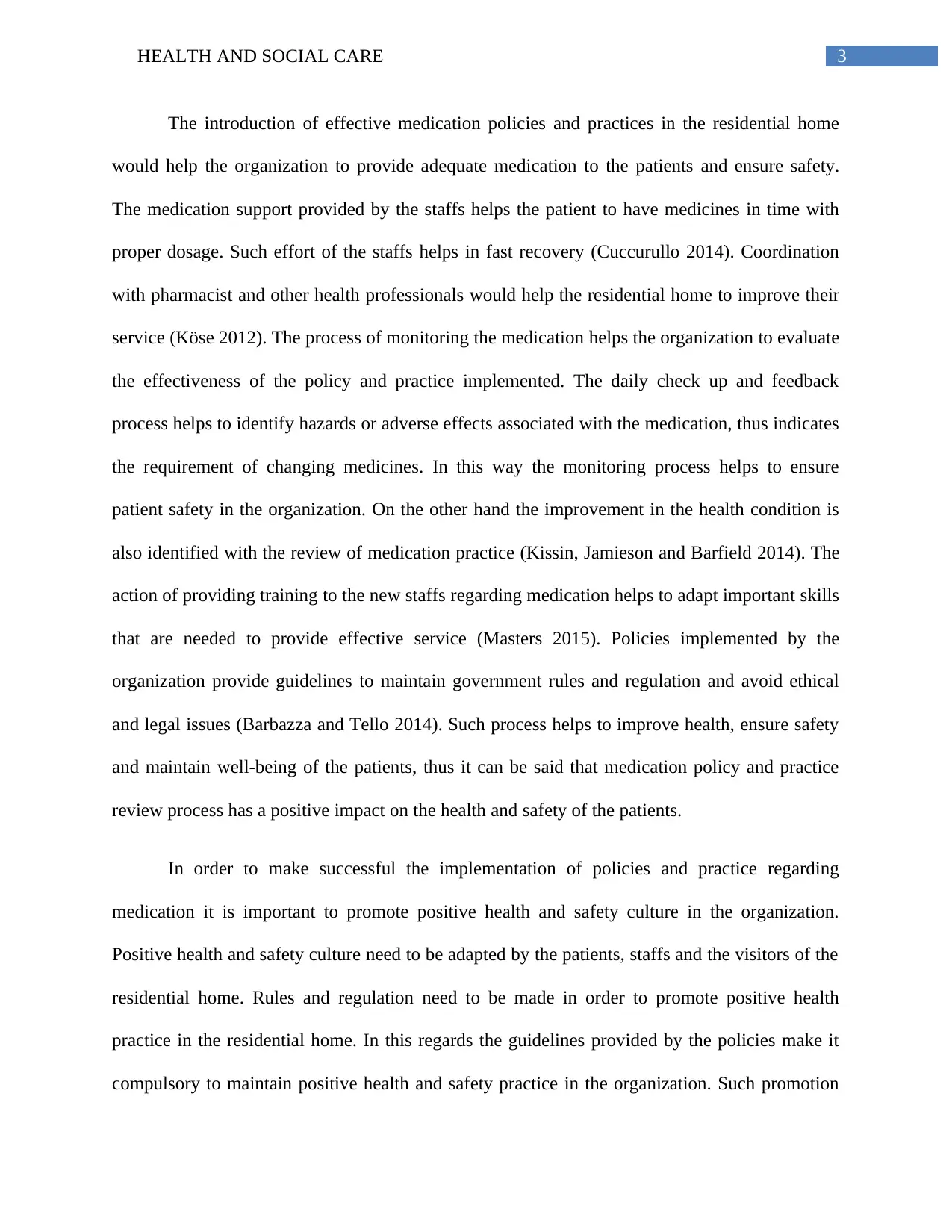
3HEALTH AND SOCIAL CARE
The introduction of effective medication policies and practices in the residential home
would help the organization to provide adequate medication to the patients and ensure safety.
The medication support provided by the staffs helps the patient to have medicines in time with
proper dosage. Such effort of the staffs helps in fast recovery (Cuccurullo 2014). Coordination
with pharmacist and other health professionals would help the residential home to improve their
service (Köse 2012). The process of monitoring the medication helps the organization to evaluate
the effectiveness of the policy and practice implemented. The daily check up and feedback
process helps to identify hazards or adverse effects associated with the medication, thus indicates
the requirement of changing medicines. In this way the monitoring process helps to ensure
patient safety in the organization. On the other hand the improvement in the health condition is
also identified with the review of medication practice (Kissin, Jamieson and Barfield 2014). The
action of providing training to the new staffs regarding medication helps to adapt important skills
that are needed to provide effective service (Masters 2015). Policies implemented by the
organization provide guidelines to maintain government rules and regulation and avoid ethical
and legal issues (Barbazza and Tello 2014). Such process helps to improve health, ensure safety
and maintain well-being of the patients, thus it can be said that medication policy and practice
review process has a positive impact on the health and safety of the patients.
In order to make successful the implementation of policies and practice regarding
medication it is important to promote positive health and safety culture in the organization.
Positive health and safety culture need to be adapted by the patients, staffs and the visitors of the
residential home. Rules and regulation need to be made in order to promote positive health
practice in the residential home. In this regards the guidelines provided by the policies make it
compulsory to maintain positive health and safety practice in the organization. Such promotion
The introduction of effective medication policies and practices in the residential home
would help the organization to provide adequate medication to the patients and ensure safety.
The medication support provided by the staffs helps the patient to have medicines in time with
proper dosage. Such effort of the staffs helps in fast recovery (Cuccurullo 2014). Coordination
with pharmacist and other health professionals would help the residential home to improve their
service (Köse 2012). The process of monitoring the medication helps the organization to evaluate
the effectiveness of the policy and practice implemented. The daily check up and feedback
process helps to identify hazards or adverse effects associated with the medication, thus indicates
the requirement of changing medicines. In this way the monitoring process helps to ensure
patient safety in the organization. On the other hand the improvement in the health condition is
also identified with the review of medication practice (Kissin, Jamieson and Barfield 2014). The
action of providing training to the new staffs regarding medication helps to adapt important skills
that are needed to provide effective service (Masters 2015). Policies implemented by the
organization provide guidelines to maintain government rules and regulation and avoid ethical
and legal issues (Barbazza and Tello 2014). Such process helps to improve health, ensure safety
and maintain well-being of the patients, thus it can be said that medication policy and practice
review process has a positive impact on the health and safety of the patients.
In order to make successful the implementation of policies and practice regarding
medication it is important to promote positive health and safety culture in the organization.
Positive health and safety culture need to be adapted by the patients, staffs and the visitors of the
residential home. Rules and regulation need to be made in order to promote positive health
practice in the residential home. In this regards the guidelines provided by the policies make it
compulsory to maintain positive health and safety practice in the organization. Such promotion
Paraphrase This Document
Need a fresh take? Get an instant paraphrase of this document with our AI Paraphraser
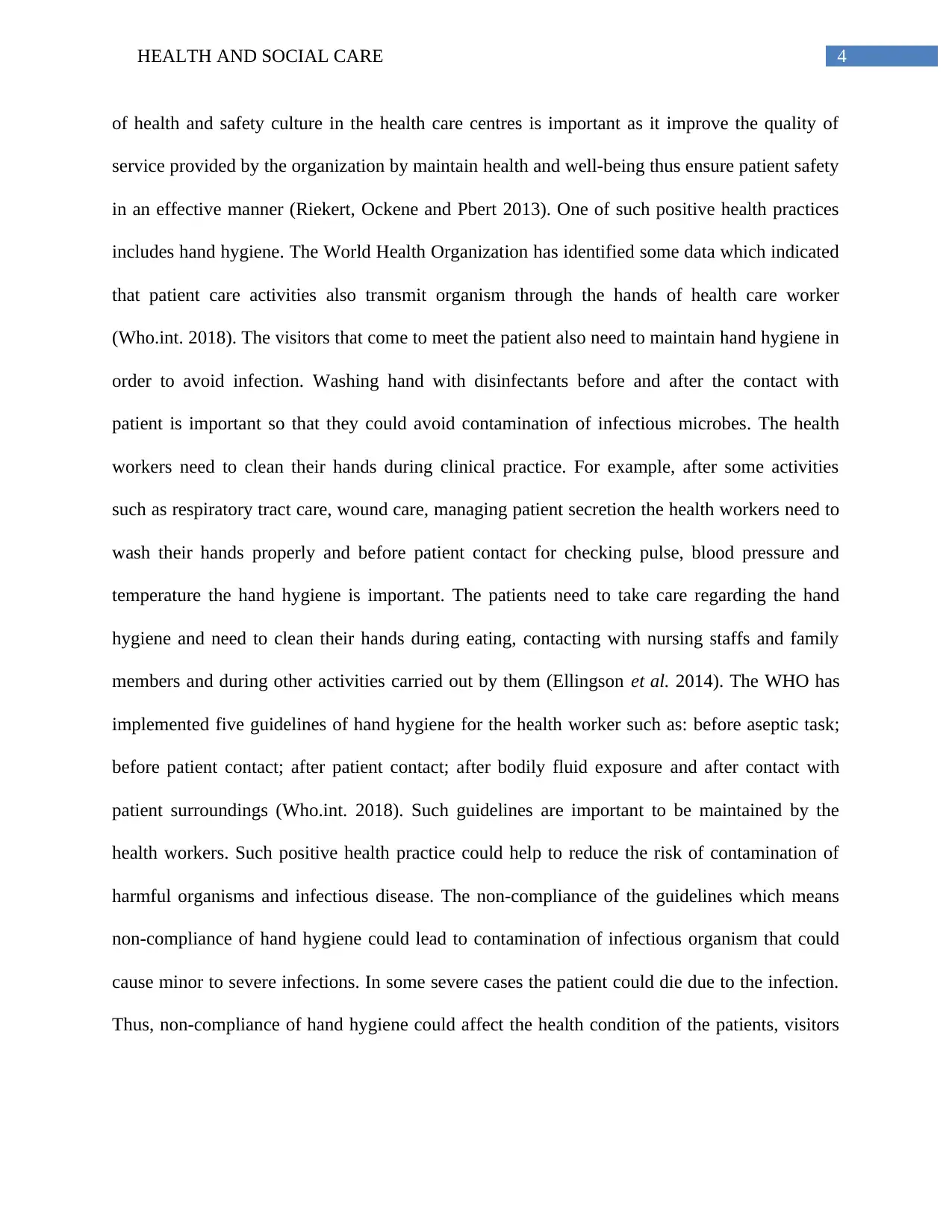
4HEALTH AND SOCIAL CARE
of health and safety culture in the health care centres is important as it improve the quality of
service provided by the organization by maintain health and well-being thus ensure patient safety
in an effective manner (Riekert, Ockene and Pbert 2013). One of such positive health practices
includes hand hygiene. The World Health Organization has identified some data which indicated
that patient care activities also transmit organism through the hands of health care worker
(Who.int. 2018). The visitors that come to meet the patient also need to maintain hand hygiene in
order to avoid infection. Washing hand with disinfectants before and after the contact with
patient is important so that they could avoid contamination of infectious microbes. The health
workers need to clean their hands during clinical practice. For example, after some activities
such as respiratory tract care, wound care, managing patient secretion the health workers need to
wash their hands properly and before patient contact for checking pulse, blood pressure and
temperature the hand hygiene is important. The patients need to take care regarding the hand
hygiene and need to clean their hands during eating, contacting with nursing staffs and family
members and during other activities carried out by them (Ellingson et al. 2014). The WHO has
implemented five guidelines of hand hygiene for the health worker such as: before aseptic task;
before patient contact; after patient contact; after bodily fluid exposure and after contact with
patient surroundings (Who.int. 2018). Such guidelines are important to be maintained by the
health workers. Such positive health practice could help to reduce the risk of contamination of
harmful organisms and infectious disease. The non-compliance of the guidelines which means
non-compliance of hand hygiene could lead to contamination of infectious organism that could
cause minor to severe infections. In some severe cases the patient could die due to the infection.
Thus, non-compliance of hand hygiene could affect the health condition of the patients, visitors
of health and safety culture in the health care centres is important as it improve the quality of
service provided by the organization by maintain health and well-being thus ensure patient safety
in an effective manner (Riekert, Ockene and Pbert 2013). One of such positive health practices
includes hand hygiene. The World Health Organization has identified some data which indicated
that patient care activities also transmit organism through the hands of health care worker
(Who.int. 2018). The visitors that come to meet the patient also need to maintain hand hygiene in
order to avoid infection. Washing hand with disinfectants before and after the contact with
patient is important so that they could avoid contamination of infectious microbes. The health
workers need to clean their hands during clinical practice. For example, after some activities
such as respiratory tract care, wound care, managing patient secretion the health workers need to
wash their hands properly and before patient contact for checking pulse, blood pressure and
temperature the hand hygiene is important. The patients need to take care regarding the hand
hygiene and need to clean their hands during eating, contacting with nursing staffs and family
members and during other activities carried out by them (Ellingson et al. 2014). The WHO has
implemented five guidelines of hand hygiene for the health worker such as: before aseptic task;
before patient contact; after patient contact; after bodily fluid exposure and after contact with
patient surroundings (Who.int. 2018). Such guidelines are important to be maintained by the
health workers. Such positive health practice could help to reduce the risk of contamination of
harmful organisms and infectious disease. The non-compliance of the guidelines which means
non-compliance of hand hygiene could lead to contamination of infectious organism that could
cause minor to severe infections. In some severe cases the patient could die due to the infection.
Thus, non-compliance of hand hygiene could affect the health condition of the patients, visitors
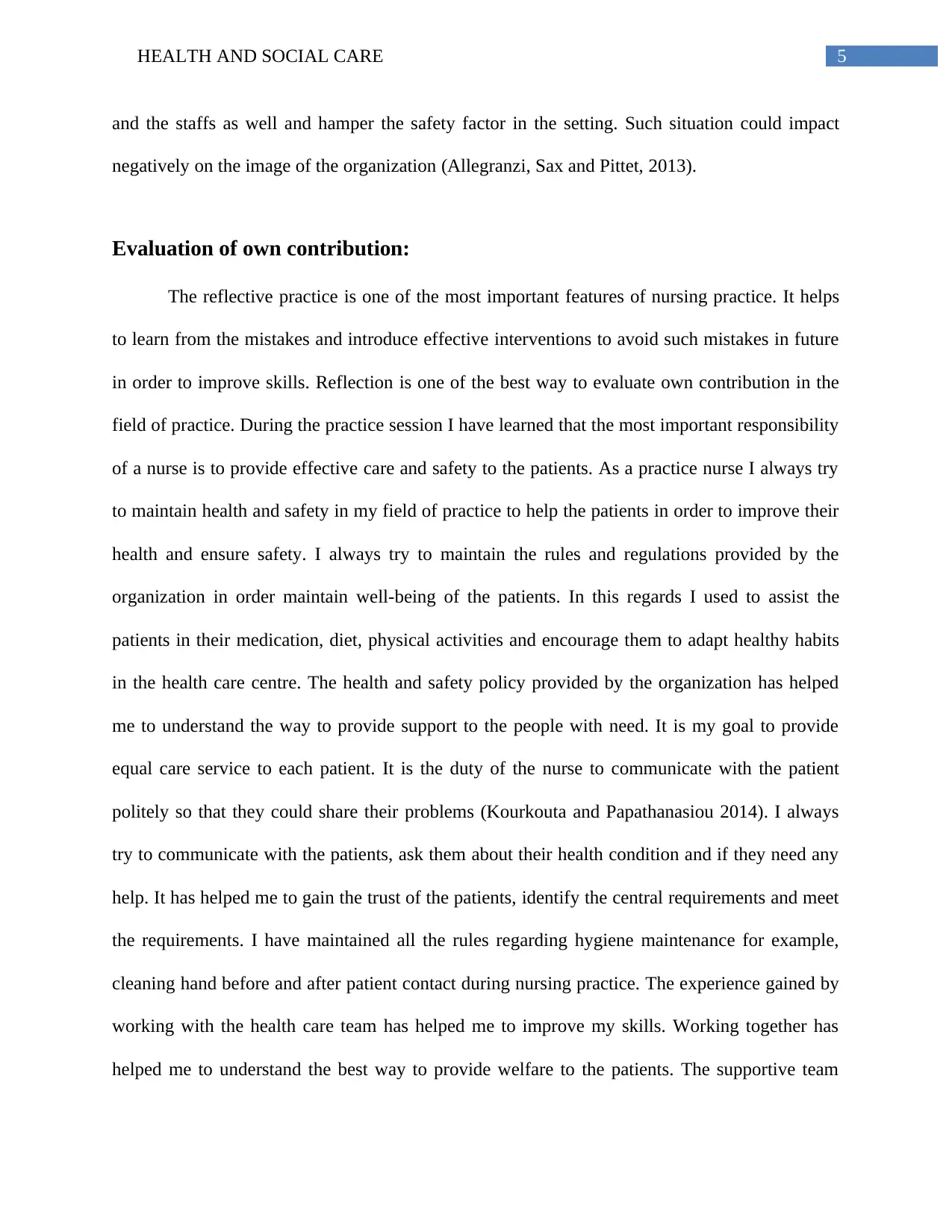
5HEALTH AND SOCIAL CARE
and the staffs as well and hamper the safety factor in the setting. Such situation could impact
negatively on the image of the organization (Allegranzi, Sax and Pittet, 2013).
Evaluation of own contribution:
The reflective practice is one of the most important features of nursing practice. It helps
to learn from the mistakes and introduce effective interventions to avoid such mistakes in future
in order to improve skills. Reflection is one of the best way to evaluate own contribution in the
field of practice. During the practice session I have learned that the most important responsibility
of a nurse is to provide effective care and safety to the patients. As a practice nurse I always try
to maintain health and safety in my field of practice to help the patients in order to improve their
health and ensure safety. I always try to maintain the rules and regulations provided by the
organization in order maintain well-being of the patients. In this regards I used to assist the
patients in their medication, diet, physical activities and encourage them to adapt healthy habits
in the health care centre. The health and safety policy provided by the organization has helped
me to understand the way to provide support to the people with need. It is my goal to provide
equal care service to each patient. It is the duty of the nurse to communicate with the patient
politely so that they could share their problems (Kourkouta and Papathanasiou 2014). I always
try to communicate with the patients, ask them about their health condition and if they need any
help. It has helped me to gain the trust of the patients, identify the central requirements and meet
the requirements. I have maintained all the rules regarding hygiene maintenance for example,
cleaning hand before and after patient contact during nursing practice. The experience gained by
working with the health care team has helped me to improve my skills. Working together has
helped me to understand the best way to provide welfare to the patients. The supportive team
and the staffs as well and hamper the safety factor in the setting. Such situation could impact
negatively on the image of the organization (Allegranzi, Sax and Pittet, 2013).
Evaluation of own contribution:
The reflective practice is one of the most important features of nursing practice. It helps
to learn from the mistakes and introduce effective interventions to avoid such mistakes in future
in order to improve skills. Reflection is one of the best way to evaluate own contribution in the
field of practice. During the practice session I have learned that the most important responsibility
of a nurse is to provide effective care and safety to the patients. As a practice nurse I always try
to maintain health and safety in my field of practice to help the patients in order to improve their
health and ensure safety. I always try to maintain the rules and regulations provided by the
organization in order maintain well-being of the patients. In this regards I used to assist the
patients in their medication, diet, physical activities and encourage them to adapt healthy habits
in the health care centre. The health and safety policy provided by the organization has helped
me to understand the way to provide support to the people with need. It is my goal to provide
equal care service to each patient. It is the duty of the nurse to communicate with the patient
politely so that they could share their problems (Kourkouta and Papathanasiou 2014). I always
try to communicate with the patients, ask them about their health condition and if they need any
help. It has helped me to gain the trust of the patients, identify the central requirements and meet
the requirements. I have maintained all the rules regarding hygiene maintenance for example,
cleaning hand before and after patient contact during nursing practice. The experience gained by
working with the health care team has helped me to improve my skills. Working together has
helped me to understand the best way to provide welfare to the patients. The supportive team
⊘ This is a preview!⊘
Do you want full access?
Subscribe today to unlock all pages.

Trusted by 1+ million students worldwide
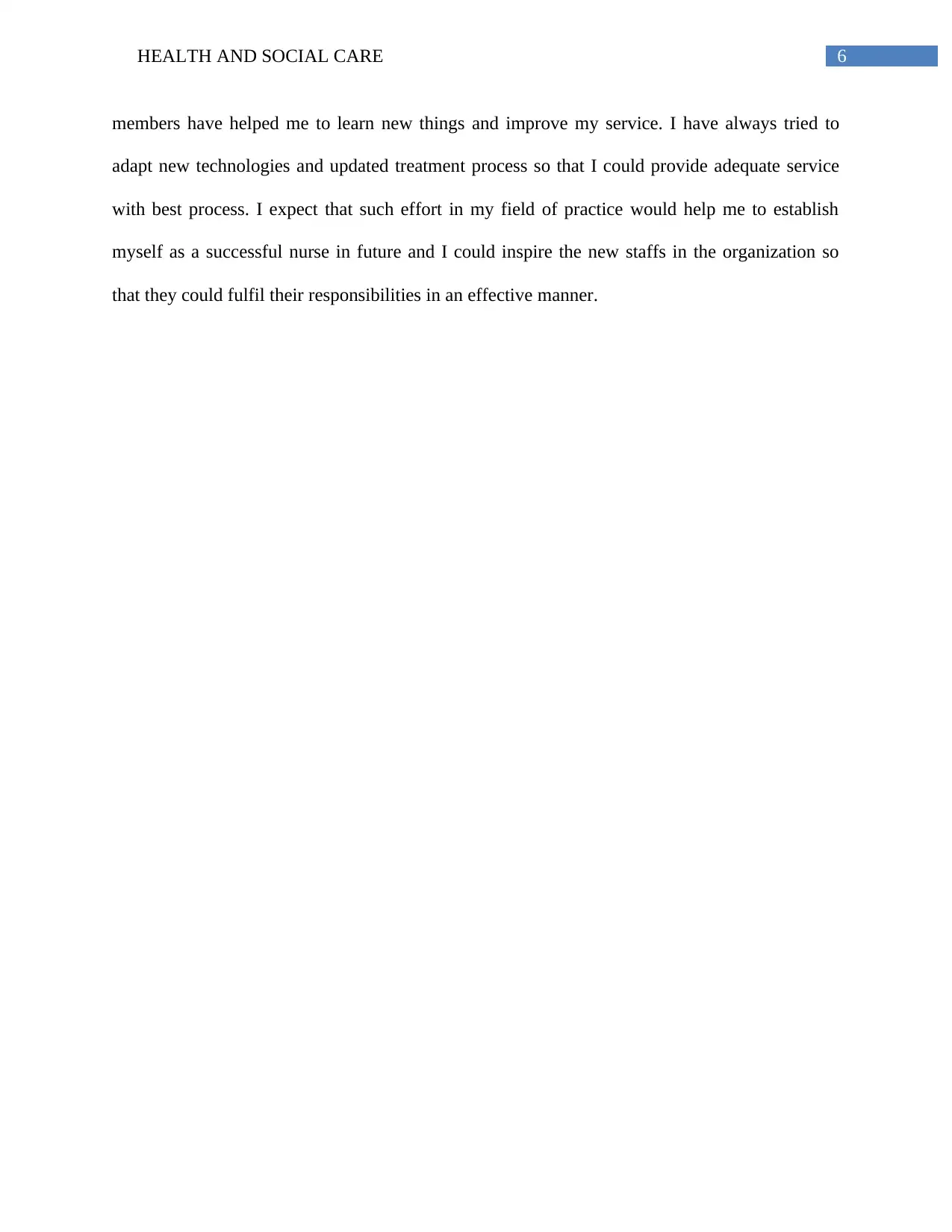
6HEALTH AND SOCIAL CARE
members have helped me to learn new things and improve my service. I have always tried to
adapt new technologies and updated treatment process so that I could provide adequate service
with best process. I expect that such effort in my field of practice would help me to establish
myself as a successful nurse in future and I could inspire the new staffs in the organization so
that they could fulfil their responsibilities in an effective manner.
members have helped me to learn new things and improve my service. I have always tried to
adapt new technologies and updated treatment process so that I could provide adequate service
with best process. I expect that such effort in my field of practice would help me to establish
myself as a successful nurse in future and I could inspire the new staffs in the organization so
that they could fulfil their responsibilities in an effective manner.
Paraphrase This Document
Need a fresh take? Get an instant paraphrase of this document with our AI Paraphraser
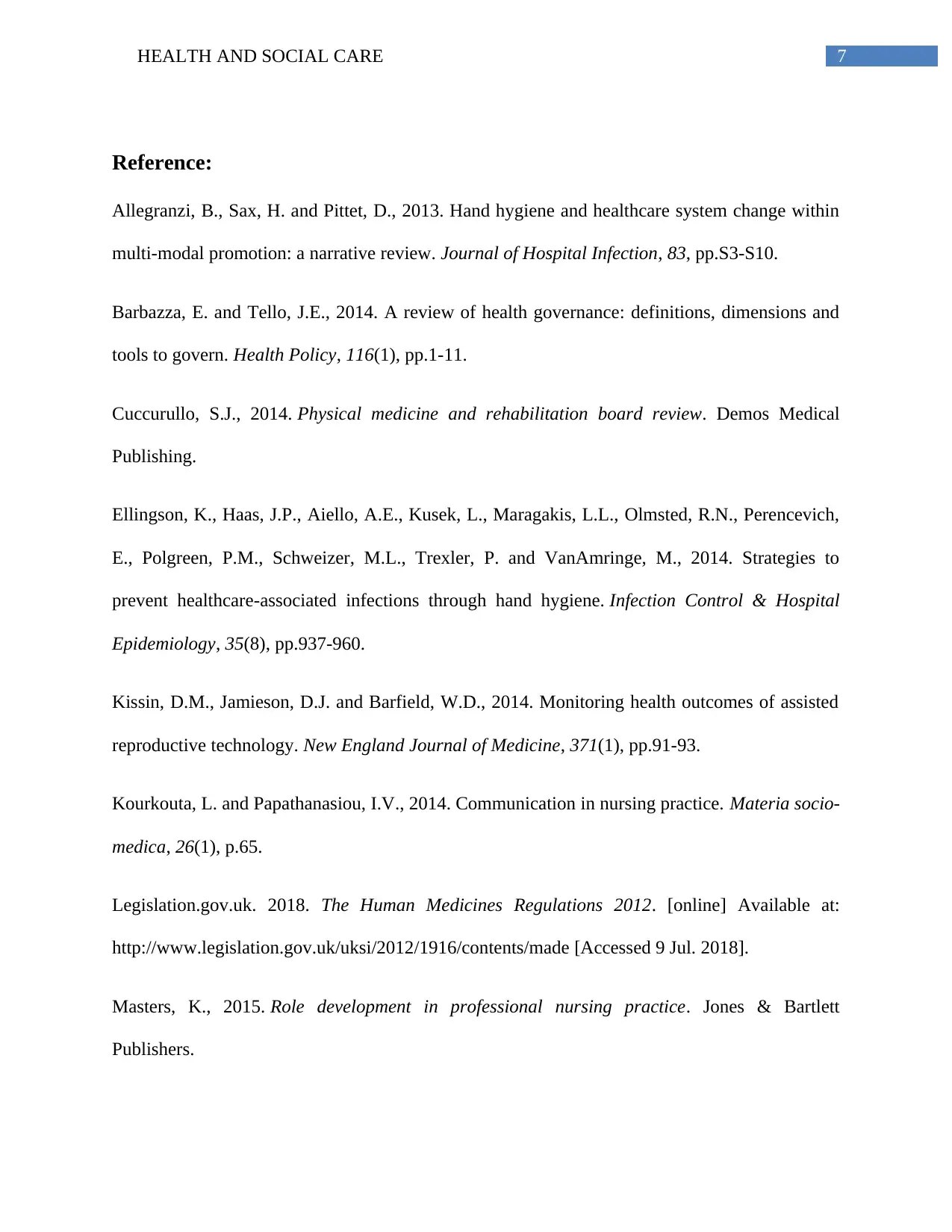
7HEALTH AND SOCIAL CARE
Reference:
Allegranzi, B., Sax, H. and Pittet, D., 2013. Hand hygiene and healthcare system change within
multi-modal promotion: a narrative review. Journal of Hospital Infection, 83, pp.S3-S10.
Barbazza, E. and Tello, J.E., 2014. A review of health governance: definitions, dimensions and
tools to govern. Health Policy, 116(1), pp.1-11.
Cuccurullo, S.J., 2014. Physical medicine and rehabilitation board review. Demos Medical
Publishing.
Ellingson, K., Haas, J.P., Aiello, A.E., Kusek, L., Maragakis, L.L., Olmsted, R.N., Perencevich,
E., Polgreen, P.M., Schweizer, M.L., Trexler, P. and VanAmringe, M., 2014. Strategies to
prevent healthcare-associated infections through hand hygiene. Infection Control & Hospital
Epidemiology, 35(8), pp.937-960.
Kissin, D.M., Jamieson, D.J. and Barfield, W.D., 2014. Monitoring health outcomes of assisted
reproductive technology. New England Journal of Medicine, 371(1), pp.91-93.
Kourkouta, L. and Papathanasiou, I.V., 2014. Communication in nursing practice. Materia socio-
medica, 26(1), p.65.
Legislation.gov.uk. 2018. The Human Medicines Regulations 2012. [online] Available at:
http://www.legislation.gov.uk/uksi/2012/1916/contents/made [Accessed 9 Jul. 2018].
Masters, K., 2015. Role development in professional nursing practice. Jones & Bartlett
Publishers.
Reference:
Allegranzi, B., Sax, H. and Pittet, D., 2013. Hand hygiene and healthcare system change within
multi-modal promotion: a narrative review. Journal of Hospital Infection, 83, pp.S3-S10.
Barbazza, E. and Tello, J.E., 2014. A review of health governance: definitions, dimensions and
tools to govern. Health Policy, 116(1), pp.1-11.
Cuccurullo, S.J., 2014. Physical medicine and rehabilitation board review. Demos Medical
Publishing.
Ellingson, K., Haas, J.P., Aiello, A.E., Kusek, L., Maragakis, L.L., Olmsted, R.N., Perencevich,
E., Polgreen, P.M., Schweizer, M.L., Trexler, P. and VanAmringe, M., 2014. Strategies to
prevent healthcare-associated infections through hand hygiene. Infection Control & Hospital
Epidemiology, 35(8), pp.937-960.
Kissin, D.M., Jamieson, D.J. and Barfield, W.D., 2014. Monitoring health outcomes of assisted
reproductive technology. New England Journal of Medicine, 371(1), pp.91-93.
Kourkouta, L. and Papathanasiou, I.V., 2014. Communication in nursing practice. Materia socio-
medica, 26(1), p.65.
Legislation.gov.uk. 2018. The Human Medicines Regulations 2012. [online] Available at:
http://www.legislation.gov.uk/uksi/2012/1916/contents/made [Accessed 9 Jul. 2018].
Masters, K., 2015. Role development in professional nursing practice. Jones & Bartlett
Publishers.
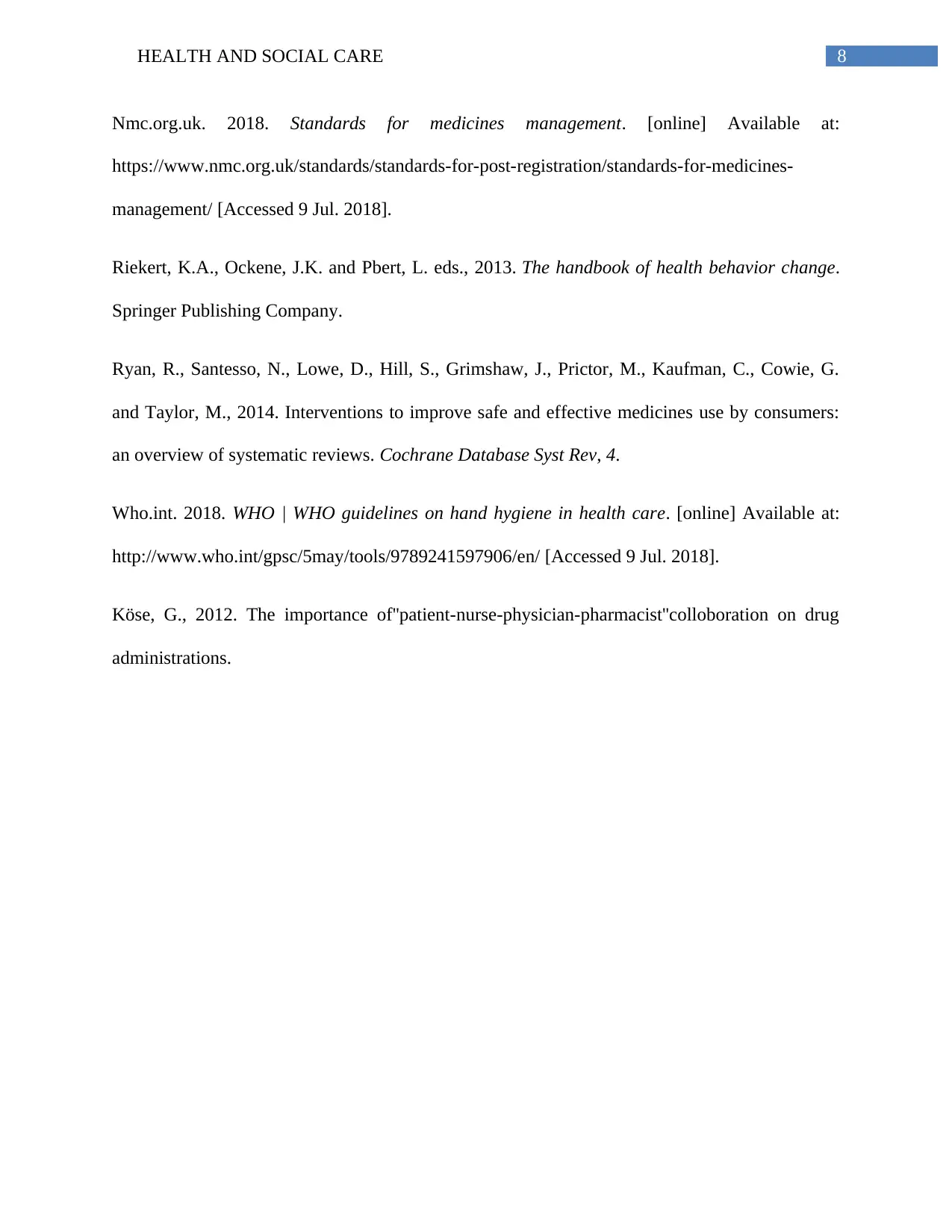
8HEALTH AND SOCIAL CARE
Nmc.org.uk. 2018. Standards for medicines management. [online] Available at:
https://www.nmc.org.uk/standards/standards-for-post-registration/standards-for-medicines-
management/ [Accessed 9 Jul. 2018].
Riekert, K.A., Ockene, J.K. and Pbert, L. eds., 2013. The handbook of health behavior change.
Springer Publishing Company.
Ryan, R., Santesso, N., Lowe, D., Hill, S., Grimshaw, J., Prictor, M., Kaufman, C., Cowie, G.
and Taylor, M., 2014. Interventions to improve safe and effective medicines use by consumers:
an overview of systematic reviews. Cochrane Database Syst Rev, 4.
Who.int. 2018. WHO | WHO guidelines on hand hygiene in health care. [online] Available at:
http://www.who.int/gpsc/5may/tools/9789241597906/en/ [Accessed 9 Jul. 2018].
Köse, G., 2012. The importance of''patient-nurse-physician-pharmacist''colloboration on drug
administrations.
Nmc.org.uk. 2018. Standards for medicines management. [online] Available at:
https://www.nmc.org.uk/standards/standards-for-post-registration/standards-for-medicines-
management/ [Accessed 9 Jul. 2018].
Riekert, K.A., Ockene, J.K. and Pbert, L. eds., 2013. The handbook of health behavior change.
Springer Publishing Company.
Ryan, R., Santesso, N., Lowe, D., Hill, S., Grimshaw, J., Prictor, M., Kaufman, C., Cowie, G.
and Taylor, M., 2014. Interventions to improve safe and effective medicines use by consumers:
an overview of systematic reviews. Cochrane Database Syst Rev, 4.
Who.int. 2018. WHO | WHO guidelines on hand hygiene in health care. [online] Available at:
http://www.who.int/gpsc/5may/tools/9789241597906/en/ [Accessed 9 Jul. 2018].
Köse, G., 2012. The importance of''patient-nurse-physician-pharmacist''colloboration on drug
administrations.
⊘ This is a preview!⊘
Do you want full access?
Subscribe today to unlock all pages.

Trusted by 1+ million students worldwide
1 out of 9
Related Documents
Your All-in-One AI-Powered Toolkit for Academic Success.
+13062052269
info@desklib.com
Available 24*7 on WhatsApp / Email
![[object Object]](/_next/static/media/star-bottom.7253800d.svg)
Unlock your academic potential
Copyright © 2020–2026 A2Z Services. All Rights Reserved. Developed and managed by ZUCOL.





